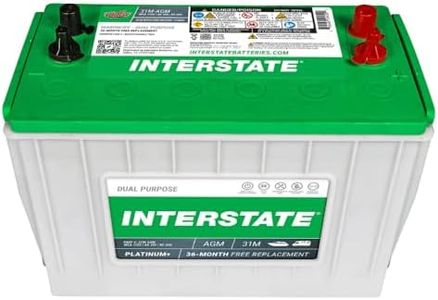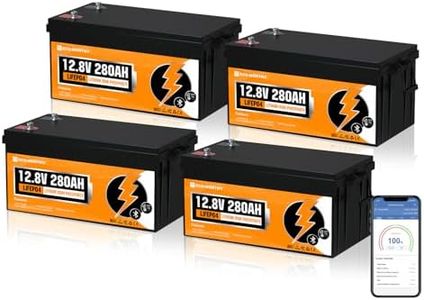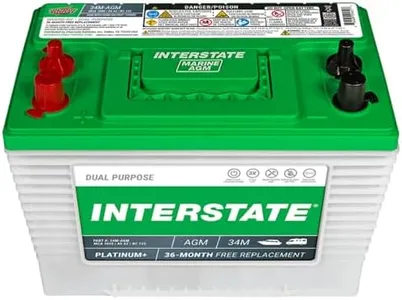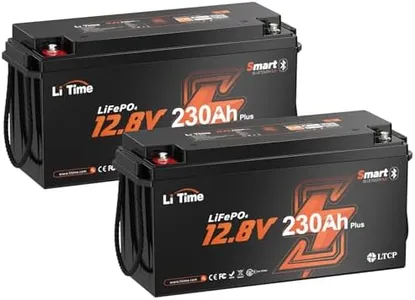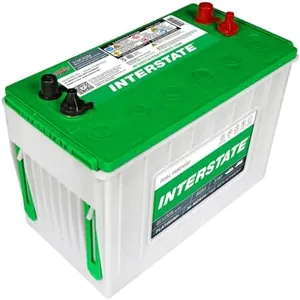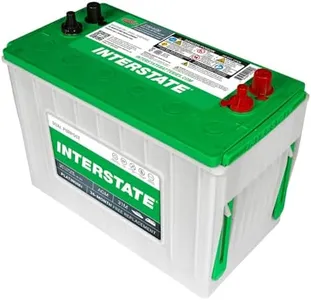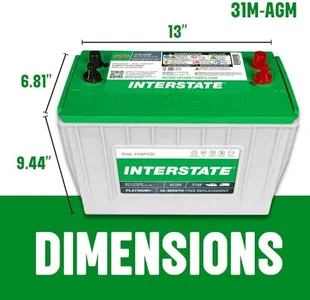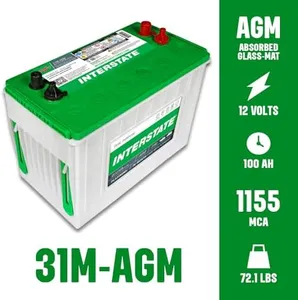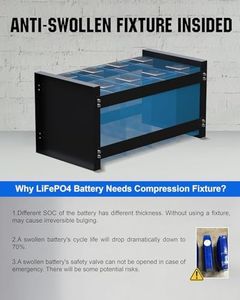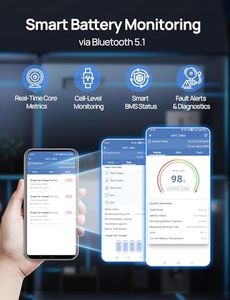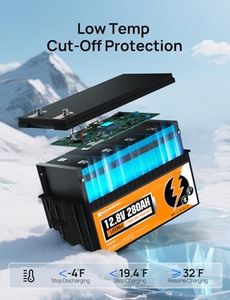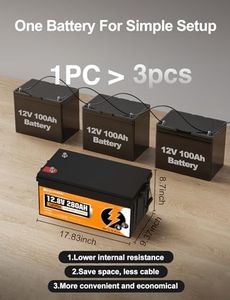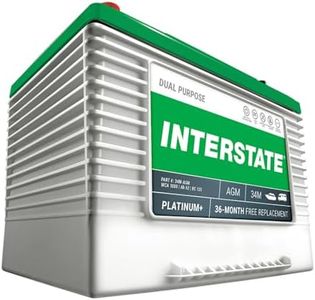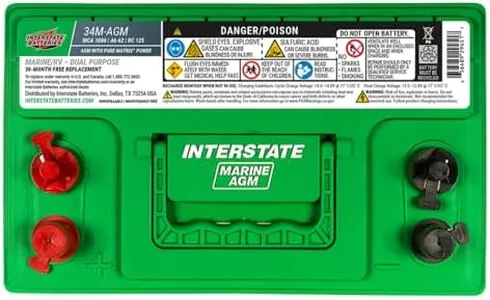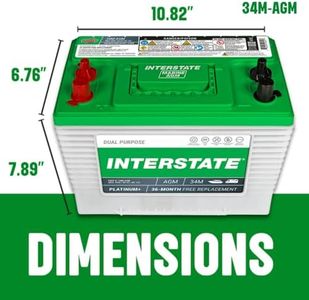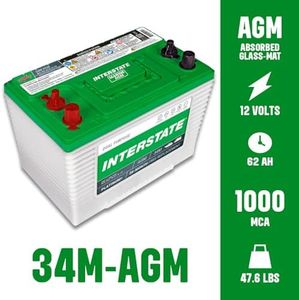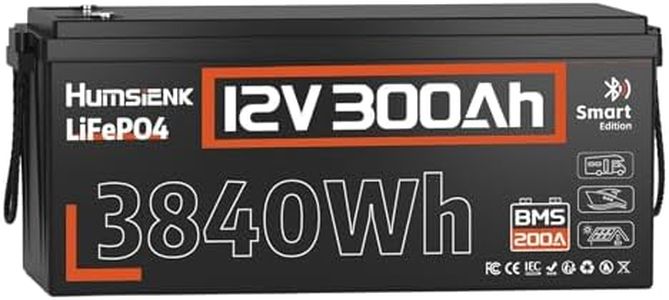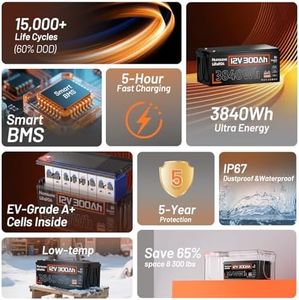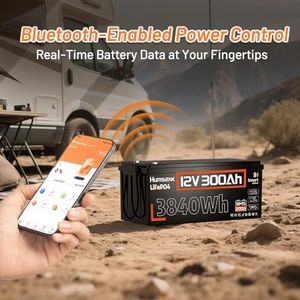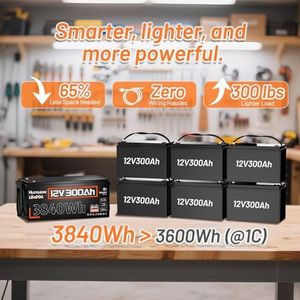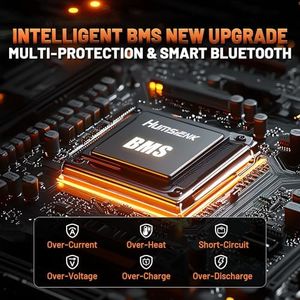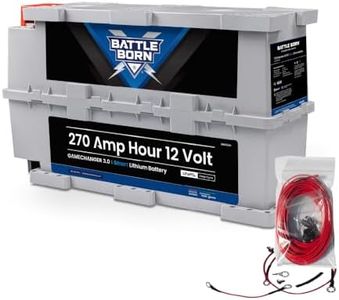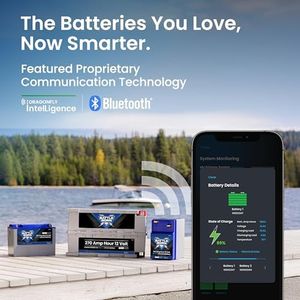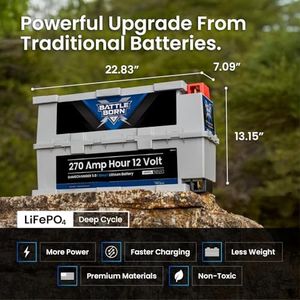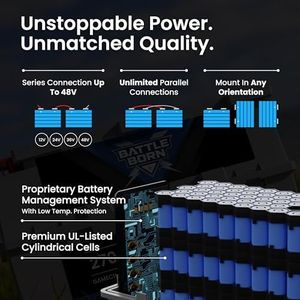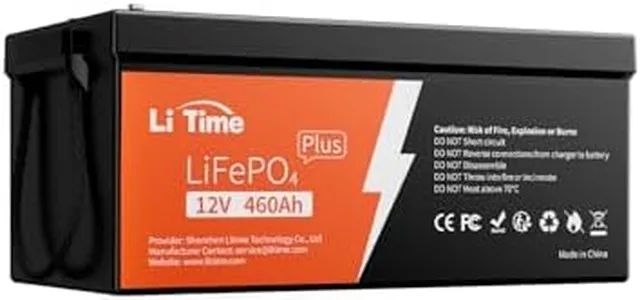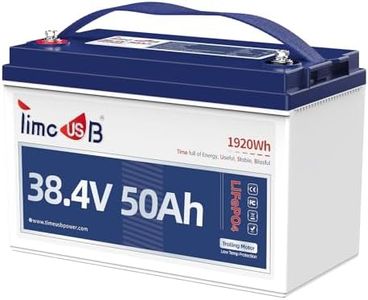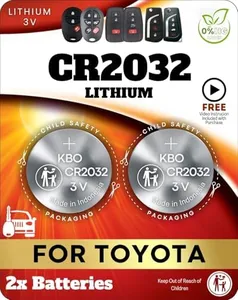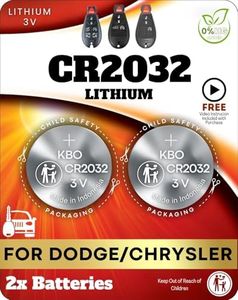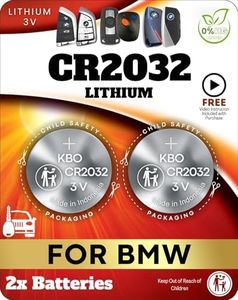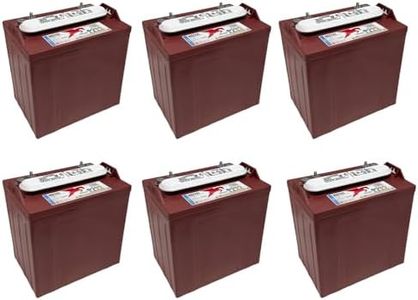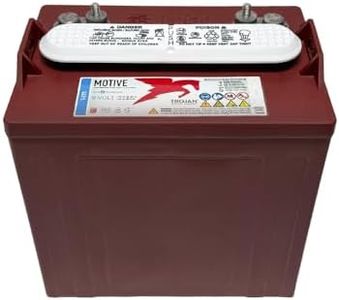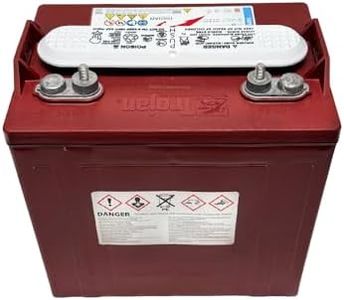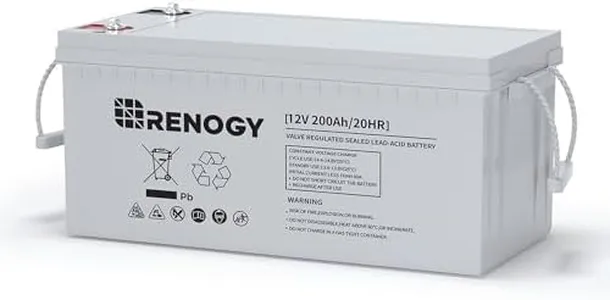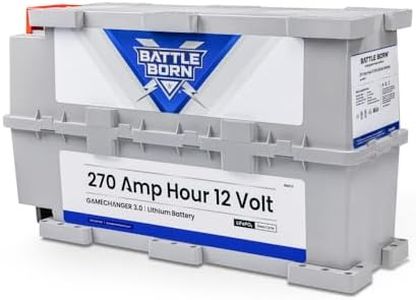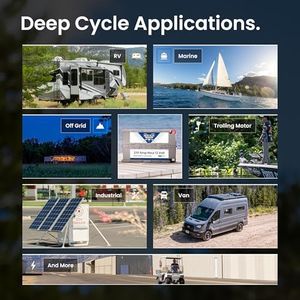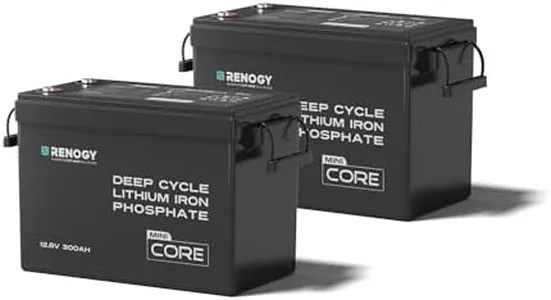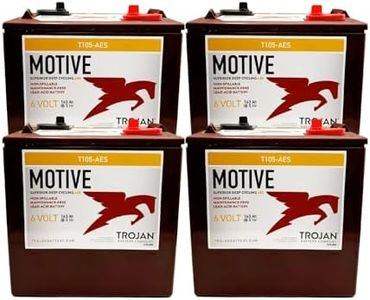10 Best Deep Cycle Rv Batteries 2026 in the United States
Winner
Interstate Batteries Marine/RV Battery 12V 100Ah 925CCA (31M-AGM) Dual Purpose Power Pure Lead AGM RV & Marine Starting Replacement Battery (Group Size 31M) Boats, RV's
The Interstate Batteries Marine/RV 12V 100Ah (31M-AGM) battery is a solid choice for RV and marine use, especially if you want a reliable dual-purpose battery that can both start your engine and power accessories like lights and water pumps. Its pure lead AGM design is known for lasting significantly longer—about 2 to 3 times the life of traditional AGM or flooded batteries—which means fewer replacements over time. It’s built tough to handle harsh conditions, which is great for outdoor adventures. With 100Ah capacity, it provides a decent amount of energy storage to run your RV’s appliances, though heavier use will drain it faster.
Most important from
82 reviews
ECO-WORTHY 48V 280Ah (4 Pack 12V 280AH) LiFePO4 Lithium Battery with Bluetooth, Low-Temp Protection, 14.34kWh Energy, for RV, Off-Grid, Solar System, Home Backup, Marine
The ECO-WORTHY 48V 280Ah LiFePO4 battery pack (made of 4 individual 12.8V 280Ah batteries) is a strong choice for RV owners and off-grid power users who need reliable, long-lasting energy. With a large capacity of 14.34kWh, it can power your vehicle or solar system for extended periods. Its lithium iron phosphate (LiFePO4) chemistry offers over 6000 deep charge cycles, which means the battery will last many years if properly maintained. The built-in Bluetooth monitoring system is a handy feature, letting you check voltage, capacity, and current easily through a smartphone app, although the Bluetooth connection works best within about 15 meters.
Most important from
334 reviews
Interstate Batteries Marine/RV Battery 12V 62Ah 800CCA (34M-AGM) Dual Purpose Power Pure Lead AGM RV & Marine Starting Replacement Battery (Group Size 34M) Boats, RV's
The Interstate 12V 62Ah Marine/RV Battery (Group 34M) is a solid choice for RV owners looking for a dual-purpose battery that can handle both starting your vehicle and powering accessories while camping. Its pure lead AGM technology means it offers excellent cycle life—lasting 2 to 3 times longer than many traditional batteries—and it can handle deep discharges better than typical flooded batteries, which is important if you run lights, pumps, or TVs off-grid.
Top 10 Best Deep Cycle Rv Batteries 2026 in the United States
Winner
Interstate Batteries Marine/RV Battery 12V 100Ah 925CCA (31M-AGM) Dual Purpose Power Pure Lead AGM RV & Marine Starting Replacement Battery (Group Size 31M) Boats, RV's
Interstate Batteries Marine/RV Battery 12V 100Ah 925CCA (31M-AGM) Dual Purpose Power Pure Lead AGM RV & Marine Starting Replacement Battery (Group Size 31M) Boats, RV's
Chosen by 1448 this week
ECO-WORTHY 48V 280Ah (4 Pack 12V 280AH) LiFePO4 Lithium Battery with Bluetooth, Low-Temp Protection, 14.34kWh Energy, for RV, Off-Grid, Solar System, Home Backup, Marine
ECO-WORTHY 48V 280Ah (4 Pack 12V 280AH) LiFePO4 Lithium Battery with Bluetooth, Low-Temp Protection, 14.34kWh Energy, for RV, Off-Grid, Solar System, Home Backup, Marine
Interstate Batteries Marine/RV Battery 12V 62Ah 800CCA (34M-AGM) Dual Purpose Power Pure Lead AGM RV & Marine Starting Replacement Battery (Group Size 34M) Boats, RV's
Interstate Batteries Marine/RV Battery 12V 62Ah 800CCA (34M-AGM) Dual Purpose Power Pure Lead AGM RV & Marine Starting Replacement Battery (Group Size 34M) Boats, RV's
HumsiENK Bluetooth 12V 300Ah Battery LiFePO4 Lithium Built-in 200A BMS, 15000 Deep Cycles Battery 3840Wh with Low-Temp Protection for RV Marine Trolling Motor Home Energy Storage Off-Grid Living
HumsiENK Bluetooth 12V 300Ah Battery LiFePO4 Lithium Built-in 200A BMS, 15000 Deep Cycles Battery 3840Wh with Low-Temp Protection for RV Marine Trolling Motor Home Energy Storage Off-Grid Living
270Ah 12V GC3 Smart Heated Lithium-Ion (LiFePO4) RV, Marine, Solar, & Off-Grid Battery - Battle Born Batteries
270Ah 12V GC3 Smart Heated Lithium-Ion (LiFePO4) RV, Marine, Solar, & Off-Grid Battery - Battle Born Batteries
Banshee T875 8 Volt, 170 AH Deep Cycle Battery - 6 Pack
Banshee T875 8 Volt, 170 AH Deep Cycle Battery - 6 Pack
Renogy Deep Cycle AGM Battery 12 Volt 200Ah, 3% Self-Discharge Rate, 2000A Max Discharge Current, Safe Charge Most Home Appliances for RV, Camping, Cabin, Marine and Off-Grid System, Maintenance-Free
Renogy Deep Cycle AGM Battery 12 Volt 200Ah, 3% Self-Discharge Rate, 2000A Max Discharge Current, Safe Charge Most Home Appliances for RV, Camping, Cabin, Marine and Off-Grid System, Maintenance-Free
270Ah 12V Lithium-Ion (LiFePO4) RV, Van, Marine, Solar, & Off Grid Battery - Internal BMS, High & Low Temperature Protection - Battle Born Batteries
270Ah 12V Lithium-Ion (LiFePO4) RV, Van, Marine, Solar, & Off Grid Battery - Internal BMS, High & Low Temperature Protection - Battle Born Batteries
Renogy 2PCS 12V 300Ah LiFePO4 Lithium Battery Mini Size, 200A BMS with Low-Temperature Cut-Off, Deep Cycle Remote Monitoring, for RV, Cabin, Marine, 600ah LiFePO4 Lithium Battery - Core Series
Renogy 2PCS 12V 300Ah LiFePO4 Lithium Battery Mini Size, 200A BMS with Low-Temperature Cut-Off, Deep Cycle Remote Monitoring, for RV, Cabin, Marine, 600ah LiFePO4 Lithium Battery - Core Series
Set of 4 | Trojan T105-AES 6V GC2 Deep-Cycle AGM 207 Ah Golf Cart Battery, Up to 3x longer cycle life than standard AGM | Maintenance Free
Set of 4 | Trojan T105-AES 6V GC2 Deep-Cycle AGM 207 Ah Golf Cart Battery, Up to 3x longer cycle life than standard AGM | Maintenance Free
Our technology thoroughly searches through the online shopping world, reviewing hundreds of sites. We then process and analyze this information, updating in real-time to bring you the latest top-rated products. This way, you always get the best and most current options available.

